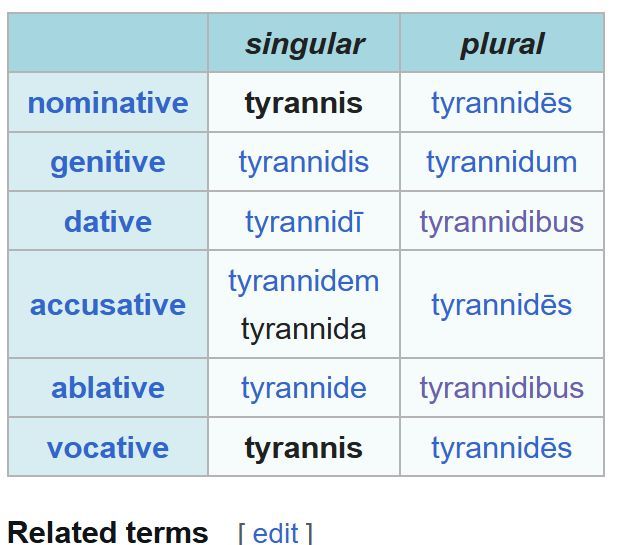In the phrase "sic semper tyrannis" the last word is singular. But doesn't the sentiment cover all tyrants? Shouldn't it be "sic semper tyrannides"? I'm hoping a more expert Latinist than I can opine.
Replies
tyrannis dative plural of tyrannus shurely?
dative plural is tyrannidibus, I think
You're probably better on this than me, I don't get to use Latin in my day job, but ... (at least I'm not the only one)
So tyrannis singular means tyranny. Tyrannus singular means tyrant - tyrannis being dat plural of the latter. (just had to look this up, I admit). If original was tyrannis they'd have had to use tyrannidi (dative singular) per your chart.
Thanks! That's actually very helpful to me (for something I'm writing)
Thanks - I can also see the argument for it being nominative singular of tyranny btw. But Booth was quoting Brutus, whose original line was meant to be Sic semper evello mortem tyrannis, which is definitely dative plural
Cf this discussion by a professor of classics tracing the phrase to Scipio Aemilianus commenting on the death of his grandson T. Gracchus (apologies if someone has already cited it): medium.com/in-medias-re...
Well, having got back from dinner and having read this, I take back my "original quote" malarkey :-)
I had no idea until I read it just now. We live and learn.
Contrary to what my source says, I believe Publius Cornelius Scipio Africanus Aemilianus was actually the disapproving *brother-in-law* of Tiberius Sempronius Gracchus: it was Aemilianus’s adoptive paternal grandfather, the first Africanus, who was the biological maternal grandfather of the Gracchi.
... and on the subject of opine: www.youtube.com/watch?v=MQ5M...
I've said it before, and I'll say it again. Oliver Hardy had a really beautiful singing voice. Stan Laurel, here, is in tune, and what he does is perfectly adequate for a comic song: but Hardy's voice is exceptionally sweet and tuneful.
I know Hardy considered a career as an opera singer, and I'm glad he went instead for comedy. Still.
And now for no reason, three of the funniest L&H moments. At number 3: "excuse me a moment, my ear is full of milk" www.youtube.com/watch?v=ZTwN...
Hardy kicking the American football down stairs. Excellent comedy work with the face-collision and hair-do disarrangement. www.youtube.com/watch?v=FeEI...
And perhaps my favourite: "why didn't you tell me you had legs" www.youtube.com/watch?v=wIbe...
An easy trap anyone might inadvertently fall into…and then you just have to go with it.
Interesting fact: Stan Laurel was born "Stanley Jefferson". He adopted the stage-name "Stan Laurel" because he considered the name "Stan Jefferson" to be unlucky, on account of it having thirteen letters.
So yes it covers all tyrants as a concept
Thanks: yes, that makes sense.
So those many hours studying Latin was not a waste after all? What a relief 😅
I think it is a nominativ singular, so the meaning is universal. We say "with" tyranny in english, but in Latin they don't. Also the "est" is implied, meaning it is nominativ and not dativ as in english.
I think if you translated it as "always thus to the tyrant", it makes sense both in the singular and also as a metonym for tyrants in general.
Tyrannis is tyranny, not a tyrant. That would be tyrannos - not quite sure if it's latinized by simply swapping the o for a u or differently.
I've always thought the last word was the dative (or possibly ablative) plural of 'tyrannus' - this is what always happens to or becomes of tyrants.
Huh. In that case you're right, "tyrannis" makes no sense at all. (Even if it meant "tyrants are like that" it should be "sic semper tyrannides".) Where does the phrase derive from? I suppose it's too much to hope that it was from someone who failed Latin?
Scratch that - it's just "this is how a tyrant always..." with a missing verb. Maybe the original was "...tyrannis cadit", or "pereat" or something.
I'd always understood it as dat pl of tyrannus - for tyrants! Dative of disadvantage?
Dative wd make sense I agree. But!
sic skeet



